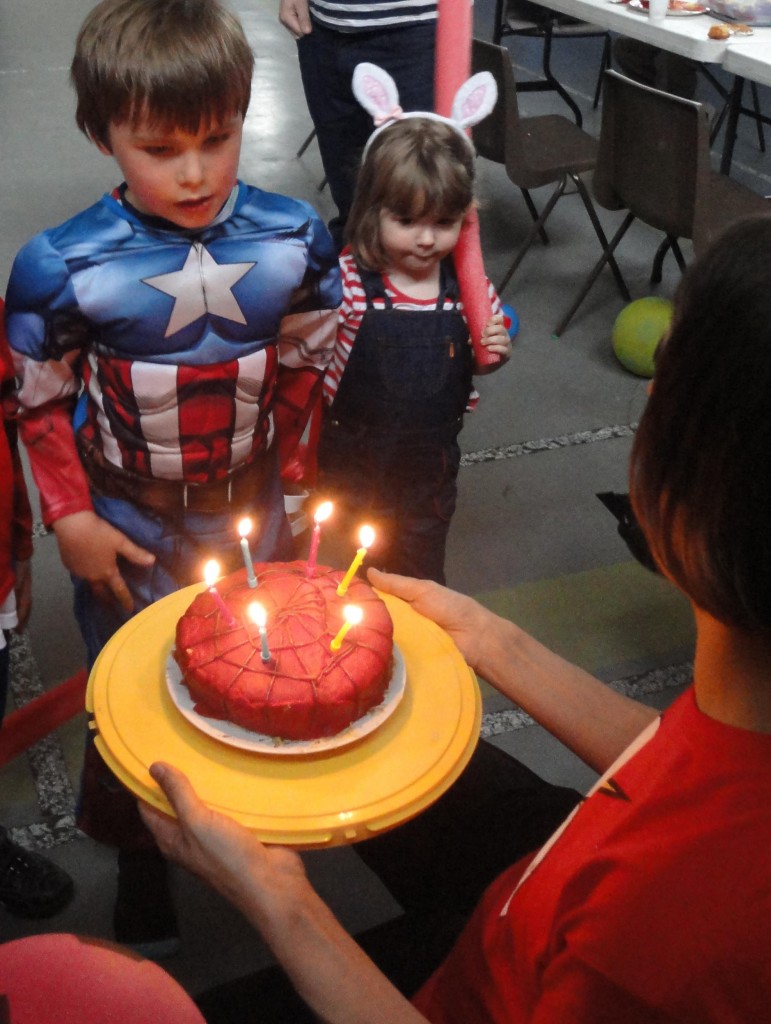Roo is 6 today. Look at him, all proud in his new Captain America costume. Ready to go and beat up some communists or something equally patriotic. He’s had an exhausting weekend, all running about with friends, playing with new Lego and eating cake. Which is surely how a 6-year-old’s birthday weekend should be. Or should it? Would a responsible mother have kept him at home, rested and quiet in time for his first ever national screening test, which happens to fall this week? Probably.
But of course I didn’t. Because he’s good at phonics. The test isn’t strenuous and he probably won’t even know he’s doing it. So I’ve barely even done the prep I’m meant to have done for it. I just kinda hope he’ll go in and ace it.
That doesn’t mean it doesn’t irk me. The whole idea of having to prep a freshly 6ed-year-old for a standardized test seems a little crazy. It’s not like he goes to a super-competitive private school, where everyone is learning Mandarin with a personal tutor from the age of 2. Just a standard state primary which, like every other school in the country, is under pressure to deliver results better, earlier, faster…and a phonics test at 6 is the tip of the super-pressurized iceberg. I don’t know what would happen to an iceberg if you super-pressurized it, so don’t ask. I only know that if you pressurize a child too much there’s a risk they’ll fall apart. Just like that metaphor.
It’s not standardized testing as such that I object to, it’s just the superfluousness of this particular one. What does the phonics test tell a class teacher that, by the summer of Year 1, they didn’t already know? And when did phonics become an end in itself, rather than just a useful tool for teaching kids to read? Why not test how well they read at the age of 6, rather than how well they can decode nonsense words? You can standardize the hell out of a reading test, ask comprehension questions and whatever else you like – just don’t put all the effort into phonics when they’ve already gone past that point. The driving test doesn’t measure you on how well you move the gearstick and put your foot on the pedals…it tests what you do with the driving competence you’ve acquired. Reading is so much more than phonics, and what’s needed is a holistic way of teaching that equips kids for every eventuality, not just decoding sounds.
Because phonics is simply not how adults read. When adults encounter an unfamiliar word, they guess by context, mentally compare it to similar words, break it down into components of meaning etc…the last thing they would do would be to sound it out aloud. In fact, you can read words perfectly well without ever having to know how to pronounce them. Which is just as well in this language known as Crazy English. But more on that later.
Say an adult has led a pretty normal life, is literate and educated but has never had the misfortune to live in a damp-infested house or the great fortune to own a copy of the Argos catalogue. In those circumstances, they may never have come across the word “dehumidifier”. But suppose they do one day, and have to try to work out what it means. I imagine it’d go a bit like this:
Step 1 – Use context. Someone posts on Facebook that “I have just bought a Victorian house and ohmygollygosh it’s riddled with damp. Anyone have a dehumidifier they could lend me?” From that, it’d be pretty easy to deduce that a dehumidifier is something that stops Victorian houses being damp. And then you could move on with your life.
Suppose there’s no context? Just a post saying “Dehumidifier for sale”. You have two more tools you can whip out.
Step 2 – Comparing it to similar words. This one isn’t always helpful. You might look at it and squint and think it looks a bit like “defiler” or “defier” or any number of words which have nothing to do with getting the musty smell out of your laundry. So you move on to Step 3…
Step 3 – Breaking it into semantic units. This is something most native English speakers could do without even thinking, and most students of English learn to do. I’d start at the end, taking the -er to mean either a person or a thing that does something…like a baker or a cooker. Expanding a bit to take in the -ifier bit, that tends to involve a process of some sort. A change from one thing to another. So, an amplifier is something that amplifies, which is a change from a quiet noise to a loud noise. We can then assume our dehumidifier changes something in some way. The next thing to take out would be “humid”, which most people would know the meaning of and then “de-” means it stops something being something. Our completed meaning-word would then be “A thing or person that changes something by stopping it being humid”. How to work out whether it’s a thing or a person? You can’t. That’s OK – even when it come to semantics, you still need to live dangerously once in a while.
The amazing thing is that native English speakers really can do this in a twinkle of an eye. So, there’s no need to sound it out and if you did using the phonics charts, you’d probably come up with something like “deh” like the first bit of “dead”, “um” like “bum”, “id” like “did”, “if” as the sight word “if”, “ie” like the phase three grapheme of “pie” and then a nice big “rrrr” on the end. Try saying that quickly…
deh-um-id-if-ie-r.
I’m not saying that phonics is useless. I’m really not. You have to start somewhere with reading and phonics is a useful way of starting, of knowing that the “a” in “cat” is the same as the “a” in “had”, but English is not a phonetic language. It’s not regular and predictable. It’s a wild mishmash of a language where a single cluster – ough – can be enough to make a non-native speaker faint (think “through”, “though”, “enough”, “borough”, “thought”…) I’m sure that phonics would work well in a language like German or Spanish, where phonetic variations are rare and logical but English is not one of those. There are a literal handful of letters in the alphabet that only have one pronunciation in English. I think I counted four. So, trying to say that the sound /e/ represents all letter “e”s is like trying to say that the Borough of Kensington and Chelsea represents all London Boroughs. It’s just not true. I think of phonics as trying to attach a lead to a dog that’s already running off across the dog park in pursuit of a rabbit or maybe a smaller dog. You might be able to impose a phonic system onto English but the chances of catching English and pinning it down to get that lead on is pretty remote when there are rabbits to be caught.
You thought the iceberg metaphor lost its way? Well, get a load of that last one. Really, I’m just checking to see if anyone’s still reading.
I suppose where I’m getting to in this whole mess of a linguistic rant is that I don’t think this particular bit of testing is worth the bit of paper the aliens are printed on. It’s not Roo’s school’s fault – they are doing as they are told – but combined with the new, condensed curriculum (Year 2 targets are now Year 1 targets) and the new system of grading schools as “Requires Improvement” if they fall below average, it all lands a heap of pressure on kids who really should just be doing what I described in the first paragraph – eating cake and playing with lego. I’m not going to even start on the unmathsishness of requiring every school to be above average but hey, I bet you just understood “unmathsishness”, even though I clearly just made it up. Ooh, literacy magic!
It all feels like a series of nails in the coffin of childhood. Five pieces of homework every week, on top of five intensive school days do not make for happy children. They make for stressed, nervy, fragile children. Roo often gets to a point where his voice wobbles, he gets confused and he can’t form his numbers any more and at that point, damn it, I’m switching on the telly or chucking him into the garden with a sword of some kind, to run around and shout “Raaargh”. I refuse to push him past breaking point as there’s absolutely nothing to be gained from it. It won’t help Roo’s generation compete with China to build our economy. It’ll help them line the pockets of therapists. Which does help the economy in a way, I suppose.
The alternative is to homeschool, which is the last thing I would ever consider doing given that I would be really rubbish at it. I don’t have the patience or the inclination to teach and I really like the social interaction he gets at school and, quite frankly, the way they take him off me for *hours* at a time so that I can hold down a job or, on a Friday, drink gin all day and watch videos of David Tennant on YouTube.
(I currently have Eva to deal with on a Friday, but one day that will be my reality. Bring it on.)
So, I’m not looking to make any radical changes but I feel a bit stuck. He’s in the system, Eva’s in the system, this is how it is now. And I truly believe that this last year or so has taken the pressure to an unprecedented level in modern schooling. I never had homework as a kid. I never had tests. Last year’s Year Ones weren’t having to achieve the things that this year’s Year Ones are. Roo’s class in Reception last year didn’t have to achieve the things that Rabittkin1’s Reception class have to achieve this year. It’s all kinds of crazy and there’s nothing I can do except rant. Oh, and vote…but I tried that and it didn’t work so I’m back to the ranting.
I know people will find plenty to argue with on this post and I’m happy for you to argue away. But if you don’t currently have a child that’s too small for the rides at Alton Towers but is big enough to be “work-stressed”, then have a little empathy for those of us that do.
To end on a happy note, here’s a nice picture of Roo enjoying his birthday breakfast. Happy birthday boy, and good luck on your big test…






